'Because of the UN vote.'
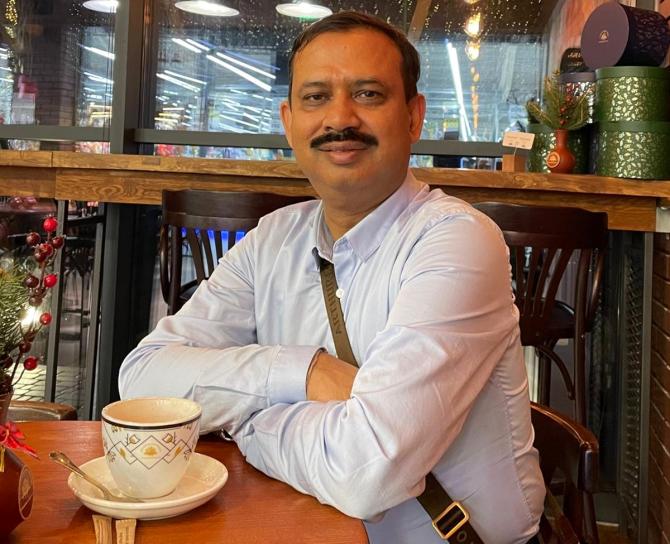
Sanjeet Sinha's voice is leaden.
He sounds defeated. He has not been sleeping well. And seems both mentally and physically weighed down by his woes.
His most immediate source of distress is figuring out a way to get out of Kyiv.
Sanjeet has probably pored over several maps for road routes, stops and studied the various borders.
Being the large country that it is, Ukraine shares an extensive double border with Romania, Moldova too, skirts Hungary and Slovakia and snuggles up to Poland for a good many hundred kilometres, actually 535 km, and 11 border crossings.
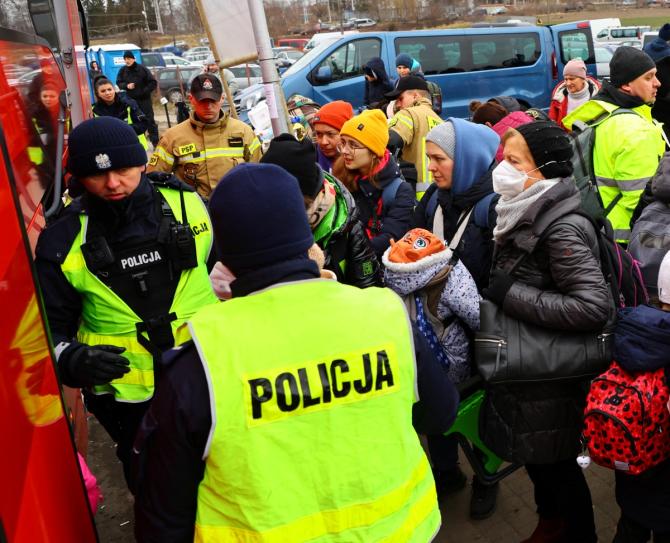
When Rediff.com'sVaihayasi Pande Daniel caught up with Sanjeet, who works in IT, in Kyiv, in a Hindi-English conversation over WhatsApp on Thursday night, he was contemplating his options.
"Mein personal karan se phas gaya hai Kyiv mein. Soch raha hoon (about leaving now), lekin rasta nahin mil raha hai. Ghadi se mein agar nikalta hu western Ukraine ke liye, toh rasta mein ho sakta hai ki loot bhi le. If I want to leave Kyiv by car, I have to, matlab doh teen ghadi saath mein nikalna padega (I got stuck in Kyiv because of personal reasons. I am thinking of leaving now, but I have not got a solution yet on how to leave. If I leave the city by car, there is a chance I could get looted. If I want to leave by car, I need to find a few others who are leaving too, so we can drive together)."
Looting, he says, is a real fear. Although he doesn't know for sure.
Certainly, the Internet contains many pics of looters being tied to electric poles with sticky tape.
Sanjeet's reasoning is that 25,000 rifles have been distributed to the public to fight the Russians, and a certain percentage might or have gone into the wrong hands.
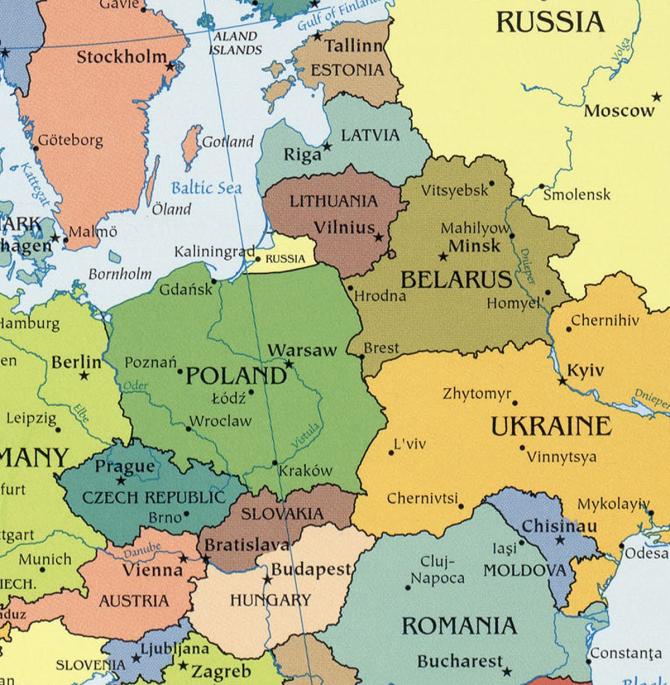
He did try calling the Indian embassy for help. "Embassy ko teen din phone karta raha (for three days I called them non-stop). All lines are busy or no one is picking up."
Later Sanjeet heard the embassy staff had left Kyiv on Monday. "Arre, pura embassy chala gaya Lviv! (The whole embassy had left for Lviv!)"
Had he known, he might have requested permission to join the embassy cavalcade that was traveling to Lviv.
"Uss samayen mere ko patta hota, mein aaram se unka convoy mein lag jaata. Embassy ka convoy ko koi touch nahin karta (If I knew then, I could have easily joined their convoy, because no one touches embassy convoys)."
If, in the next day or so, he can find a few others to travel with, Sanjeet feels he could head to Ternopil or Ivano-Frankivsk or Mukachevo or maybe Lviv in western Ukraine.
He has friends in all these places who could give him sanctuary.
"Mein koshish toh kar raha hoon. Mein any western town mein jaana chahta hoon pahele (I am trying. I want to first go to any western town)."
From western Ukraine he would eventually head to the border with his half-Ukrainian 17-year-old son (his late wife was Ukrainian).
His eldest IT recruiter son -- who is 28 and has already done "essential time" in the army earlier -- would not be able to leave because he is of military-recruitable age. "Chaho toh bhi bahar nahin leke ja sakte hai (Even if I wished to take him, I cannot take him out)."
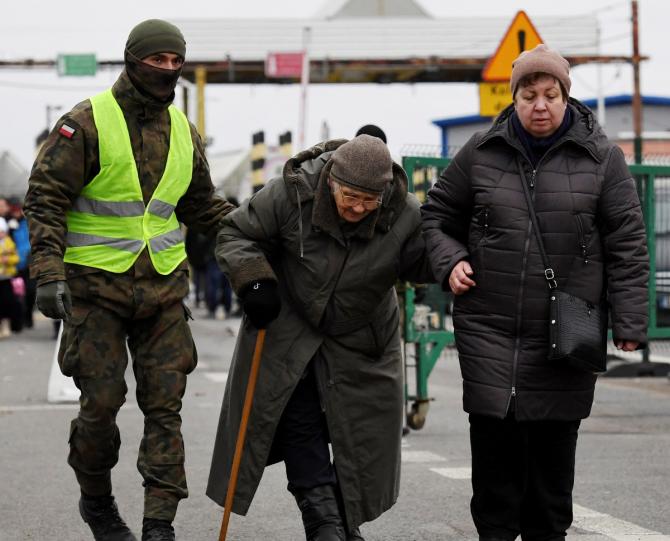
Crossing any border into the EU should not pose a problem either for him or his younger boy though. Easier for his son, but he too now has permission papers to leave.
"Just wahan tak pahuchna zaroori hai. Wahan se phir plan banaoonga kidhar nikalna hai, kaise nikalna hai (It's most important to first reach the border. From there I will make a plan on where to go and how to go)."
"Poland border par approximately 36 hours ka line laga hua. Woh 36 hours agar aap paar kar jaate hai toh Poland border ke andar 20 hours ka line lage hai. That is troublesome. Iss liye mein uss side ja ke rukna chahta tha ki thoda der ruk kar. Maybe line thoda kam ho jata (The line to Poland is 36 hours long. If you complete that then the line inside the Polish border is 20 hours long. That is troublesome. Therefore I want to reach that side -- western Ukraine -- and wait there. Perhaps the line will decrease)."
"Then maybe I can try in Hungry too. Yahan se nikalna ka possibility mil jaye uske baad dekhenge (First let find some possibility to leave here and I will see after that)."
But at the moment Sanjeet is stuck.
He doesn't know of anyone who still wants to leave. Those left behind now don't want to go anywhere.
He is paying a heavy price for being trapped.
There is the worsening worry that chews away at one's well being. The anxiety must keep him up all night: "Yes! Because I can't sleep with the sounds of this shelling."
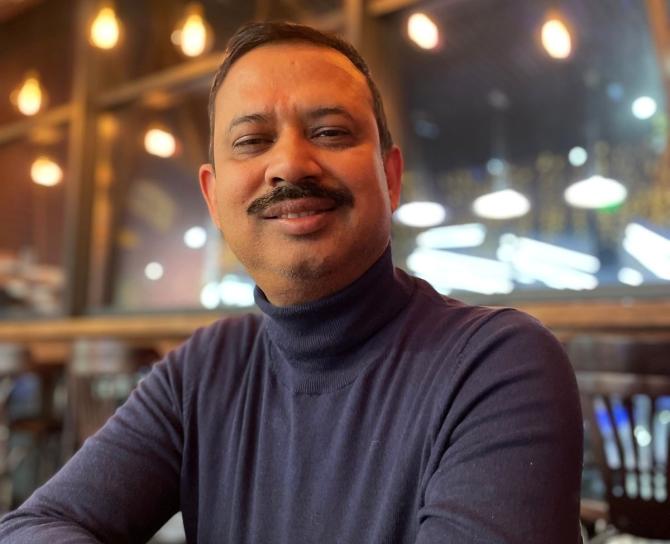
He doesn't live in the city proper, but on the outskirts, 1 km from the Great Ring Road that encircles Kyiv, in a house, without a basement, with his younger son.
The distance from the city means there are no Metro stations nearby or bomb shelters to dive into when the shells rain down fiercely. Nor can they even hear the air-raid sirens
But that doesn't mean his part of the city isn't affected. "Attack ho raha hai. Mein apne aakhon se fighter planes dekha hu. Yeh ho sakta hai ki Ukrainian fighter plane bhi ho. Aaj (Thursday) hi ek rocket mar giraya ek Russian plane ko. Woh humare ghar se ½ km ke distance par ek warehouse par giraya (Attacks are on. I saw fighter planes with my own eyes. They could be Ukrainian ones too. Today a rocket knocked down a Russian plane onto a warehouse just half a km away from us)."
Crawling out by car, when the curfew relaxes, to reach grocery stores located at half a kilometre's distance is equally nerve-racking. "Lekin nikalna toh padta hai. Food kuch laya tha. Thoda sa medicine, line mein doh ghanta lag kar, laya. Aadha mila. Aadha nahin mila. Life-saving drugs jo hai, woh nahin mil raha hai mere ko (But you have to get out. Brought some food. A little medicine after standing in line for two hours. I got only half. Could not any life-saving drugs)."
Cash is not posing a problem yet because all the supermarket counters are giving 500 hryvnia in cash for any grocery bill above 100 hryvnia.
Sanjeet feels the Indian embassy could have been more help to the Indians who are settled in Ukraine for many years.
They have not been in touch with the Indians left behind, in Kyiv for instance.
He doesn't have much connection with the embassy because he hadn't needed to have in the 30 years he has lived in Ukraine, after going there to study IT in Lviv in 1990 from Darbhanga, Bihar, and later starting an IT business of his own.
But his address, phone number and email are listed with the embassy and there are not that many Indians residing permanently in Kyiv, or even elsewhere in Ukraine (about 150 or so), for them to keep track of. "Phir bhi ek baar call kar ke puch leta. Courtesy call. Nahin pucha (Even so they could have made one call and asked. Courtesy call. They didn't)."
The reports about the kind of help the Indian embassy has delivered are mixed, he agrees. Many have praise to offer, but Sanjeet says: "Mera phone nahin uthaya, toh mere liye zero Indian embassy (They never answered my call so as far as I am concerned the Indian embassy was of zero help)."
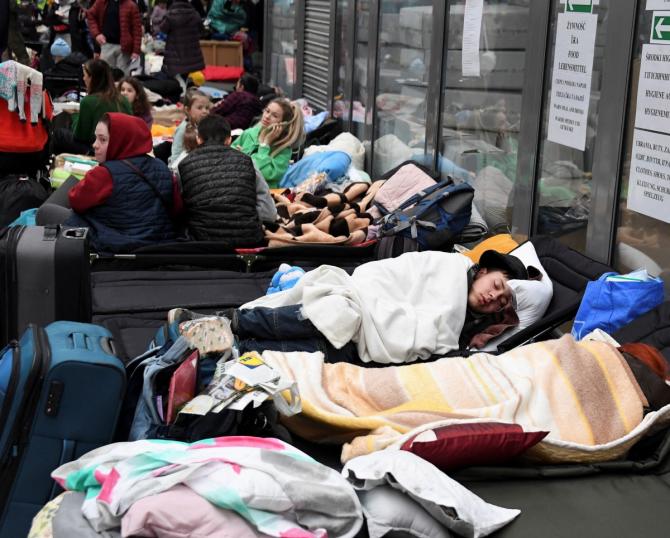
Returning to India for good isn't on the cards. Sanjeet isn't really studying his cards at the moment.
He actually had a plan to visit India when the Russian threat began to escalate, but then commercial flights stopped.
"India ko mere ko jaana hi tha. Mera ticket kata hua tha 28th ka (I wanted to go to India. We had tickets for February 28).
He has two brothers working for the government, one for the defence ministry in New Delhi and another for the railways in Ajmer. And a sister married to a senior IT professional in Bengaluru.
He believes, fingers crossed, he should get a seat on a relief plane. "My boy is non-Indian (passport-holder) but he is my son. Even if he does not get, I will buy a ticket (on a regular flight)."
But India cannot be a long-term solution.
Sanjeet says sadly, ruefully, "Bheek mangne ki stithi mein rahta hoon (I am in a situation where I will be begging). What will I come to India and do? Karoonga kya mein? For 30 years I have worked here."
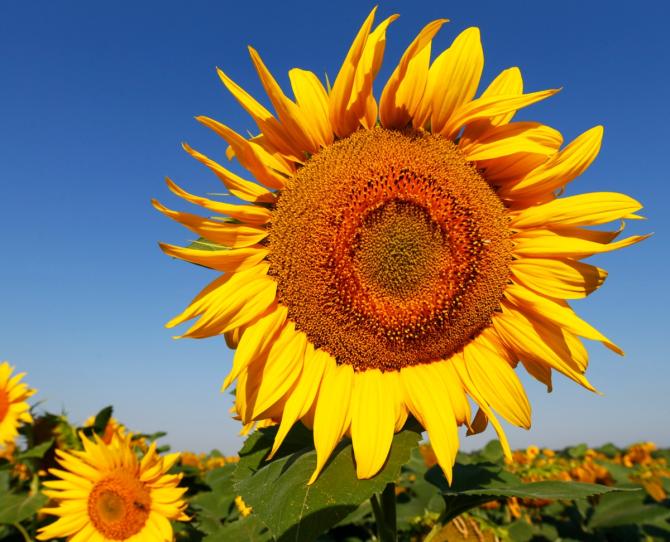
And would he ever be able to return to Ukraine?
Would there first of all be a life to come back to in Ukraine?
More importantly: Would there be a life for an Indian in Ukraine?
"Earlier they loved Indians. Now they hate Indians. Kyonki India UNO mein inka favour nahi kiya (Because at the UNO, India did not vote in their favour)."
That explains what happened on the border and on the trains.
"Border pe Ukrainians de raha hai takleef Indians ko. Train mein students ko laath mar ke gira diya (Ukrainians are troubling Indians at the border. Indian students were kicked off trains)."
That's not all. "There will be more problems. Log samajhte nahin iss baat ko (People do not understand these things). They were trying to take the Kharkiv students out of Ukraine via Russia. Russia is the attacking country. That will anger the Ukrainians further. Aur matlab hum log ka shayad rehna mushkil ho jayega yahan (it might become difficult for us to live here later)."
He adds, "Stand achcha hai. India ka koi bhi yahan par credit nahin hai (India's stand is great. India has no credit here locally).
<p"It was not hard to evacuate the Indian students, who had already reached the border. They could have left for India on their own means. The only thing is that the government is taking them free. That any government could have done.
"They should have given much more facilities to cross within Ukraine. Jo troubled areas tha, bachhe khud par kiye (The children crossed the troubled areas by themselves). To after that go to another country and pick them up is not a matter of credit. Troubled-wale areas se aap nikal nahin pay (But you [the government] was not able to rescue them from the troubled areas)."
Anyway, Sanjeet is not bothering to picture the future and how India's diplomatic stand might affect it.
All energies are focused on leaving Kyiv. "Pahele yahan se jaan to bach jaye (First let me save my own life and his son's)."
On Saturday early morning, India time, a message arrived from Sanjeet in response to earlier unanswered messages from this reporter: "Sorry. I was busy in running away from Kyiv. Just reached Vinnytsia.
Monday afternoon update: Sanjeet has arrived in Moldova.
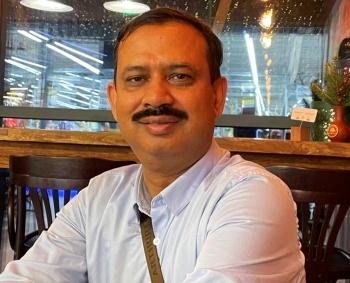
Feature Presentation: Rajesh Alva/Rediff.com








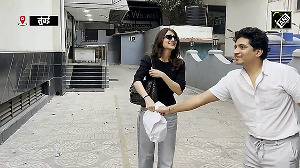
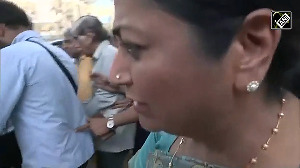

 © 2025
© 2025